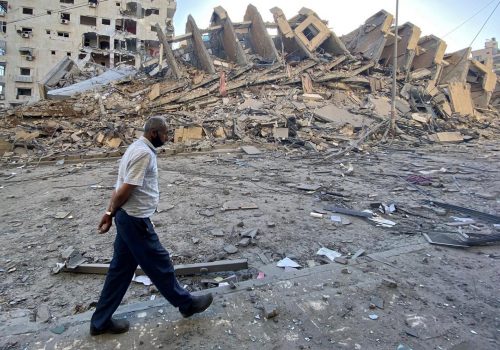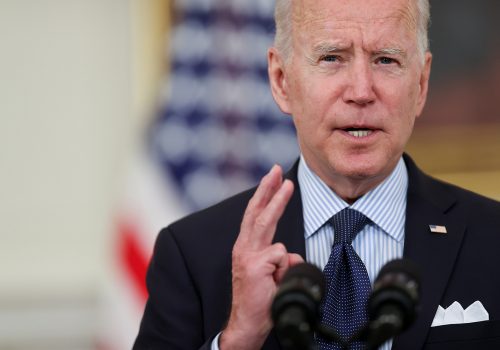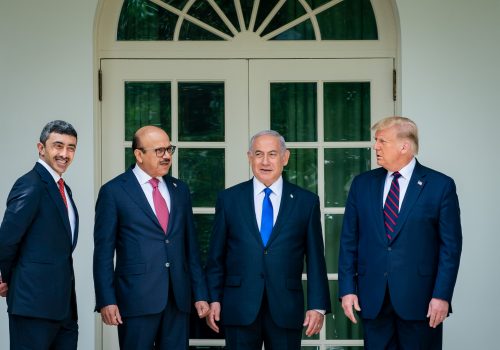The escalation between Israel and Hamas: What’s new—and what’s not
The current escalation between Israel and the Gaza-based Hamas and Islamic Jihad factions was not generated in a vacuum. While the intensity of the fighting appears to have caught some veteran practitioners of Middle East conflict and diplomacy by surprise, a trail of discernable factors led to this fraught outcome.
April witnessed repeated clashes near Jerusalem’s Damascus Gate, where Israeli police took measures to prevent Palestinians from congregating after evening prayers during the Islamic holy month of Ramadan. The restrictions, which were implemented ostensibly to preclude an outbreak of violence, had the opposite result. A clip uploaded that month to TikTok—with Palestinian teenagers filming themselves as they assaulted religious Jews gratuitously on the Jerusalem Light Rail—foreshadowed new heights of defiance in resisting Israel’s authority.
Tensions have flared further in May, amid expectations that eviction notices to Palestinian residents of the city’s Sheikh Jarrah neighborhood—and upheld in March by the Jerusalem District Court—will be enforced imminently. Israel’s government, accused by critics of applying “inherently discriminatory laws,” has characterized the standoff as a “real-estate dispute between private parties” (the matter is now pending before the country’s High Court of Justice). Itamar Ben-Gvir, an extremist right-wing member of parliament, exacerbated passions when he relocated his office to Sheikh Jarrah—directly across from a rival Palestinian cohort. Ben-Gvir vacated the scene a few days later, but not before being reportedly informed that Gaza militants might dispatch missiles to Jerusalem if he did not decamp.
Political instability within both the Palestinian Authority and Israel has been pivotal as well. Much anticipated Palestinian elections, scheduled originally to commence in May, have been postponed indefinitely. Palestinian President Mahmoud Abbas has attributed the delay to Israel’s apparent unwillingness to permit voting in East Jerusalem. An equally plausible theory, however, asserts that Abbas—whose challengers view him as passive and irrelevant—scuttled the ballot for fear of being deposed. Through his actions, Abbas has compromised his ability to exercise control and, simultaneously, empowered aggrieved parties such as Hamas—which holds designs of assuming leadership in the West Bank—to vent their frustration with a vengeance. An aggressive posture by Hamas may strengthen its hand toward a future faceoff with Abbas, but, paradoxically, by inflicting indiscriminate harm on Israeli civilians, it also runs the risk of undermining any sympathy that Palestinians have won in making their case for Jerusalem.
In Israel, negotiations to form a new coalition are continuing after four inconclusive elections in under two years have all but decimated the popular legitimacy of the country’s political chieftains. With deadlines approaching for the presentation of a new government, Israelis could instead be destined for an upcoming fifth visit to the polls. In the interim, Benjamin Netanyahu, Israel’s caretaker premier, finds his decisions questioned on suspicion that they subordinate national interests to political expediency.
Charges have also been levelled at the Israeli police, whose poor performance—including deficient supervision of a recent festival in Meron, where forty-five Israelis died in an exit stampede, and the sudden removal of barriers outside the Damascus Gate—has fed this atmosphere of chaos. Kobi Shabtai, the newly-appointed commissioner, was a dark horse candidate for the post. His boss, Public Security Minister Amir Ohana, has left the bungling Shabtai and his subordinates to fend for themselves. After the Meron incident, an initially silent Ohana emerged to say that he accepted responsibility for the tragedy, but that “responsibility does not mean blame.” Israel’s dysfunctional government approaches its Gaza predicament with a record showing an inability to make decisions. And, with the country’s right-wing on the brink of a potential stint in opposition and fearful of ascendant centrist and left camps, conservative elements are inclined toward provocation.
Even the calendar has contributed significantly to the powder keg. The long, sweltering days of Ramadan, during which practicing Muslims refrain from food and drink, have infused the air with raw sensitivities. Culminating with the Eid al-Fitr holiday on May 12, the month of large prayer assemblies and iftar (break-fast) dinners stirred religious fervor and trained the focus of Palestinians on Jerusalem. It also coincided with Israeli commemorations of Jerusalem Day—celebrating the city’s reunification under Israel’s rule—on May 10, when throngs of flag-waving Israeli youth paraded through the streets, underscoring their ownership of Jerusalem. That day also featured police battling—again—with Palestinian protestors on the Temple Mount or Haram al-Sharif—during the most sacred week in the Islamic year—and yeshiva (seminary) students being barraged by rocks near the Tower of David at the entrance to Jerusalem’s Old City. On May 15, Palestinians will mark Nakba Day, the anniversary of Israel’s founding in 1948.
What distinguishes this latest round of hostilities are the quantity, value, and possibly duration of its components. In a throwback to Operation Protective Edge in 2014, the Israeli Defense Forces have demolished an assortment of Hamas installations and apartment high-rises in Gaza. Dozens of Gaza residents have been killed, including senior Hamas and Islamic Jihad operatives who have been targeted personally. For marks of this caliber to be in Israel’s crosshairs at such an early stage of the confrontation is not commonplace, and may be intended to exploit the limited window of opportunity before the sides disengage. Netanyahu’s May 11 pronouncement that the bloodshed “will be on the heads” of Hamas and Islamic Jihad—and his pledge that “this campaign will take time”—indicate that Israel has no immediate plans of drawing down its forces. Thousands of reservists have already been mobilized.
Hamas, after issuing an ultimatum for Israel to roll back its presence on the Temple Mount and in Sheikh Jarrah, launched rockets toward Israel’s capital on May 10. It has since followed up with hundreds more launches—including multiple attacks on the metropolitan Tel Aviv area—inflicting death and injury. At one point on May 11, Ben Gurion International Airport was obliged to suspend traffic and divert flights elsewhere. A passenger bus in Holon suffered a direct hit. The Eilat-Ashkelon energy pipeline was struck, sending flames high into the night sky. Israelis haven’t felt this vulnerable to violence in recent memory.
More worrisome is unprecedented domestic unrest—with Arabs and Jews coming to actual blows—that has erupted in mixed-population cities across Israel and overwhelmed police capabilities. A state of emergency has been declared in Lod, where Arab arsonists set fire to synagogues and Torah scrolls had to be whisked away to safety (a curfew has since been instituted in the city). More incidents occurred in Jaffa, Acre, and other cities, testing Israel’s fragile brand of coexistence to its limits. Continued rioting would threaten the delicate fabric of Israeli society. This negative trend comes on the heels of what was perceived widely as greater integration of Israeli Arabs into civic life. Allowing Hamas to drive a wedge between Arab and Jewish citizens of Israel would be a net loss to both groups.
Netanyahu, who did not engineer the present conflict—notwithstanding his willingness to tolerate a tit-for-tat relationship with Hamas while virtually shunning Abbas—could reap political benefit from the deterioration. His prospective replacements will argue that, with anarchy raging in Israel, the imperative to unseat him has never been more acute, but they will face a steep, uphill battle. The Arab parties, which Netanyahu’s potential successors have been courting, will now be more reluctant to join hands in crafting a new government with the likes of the center-left Yesh Atid Party’s Yair Lapid and Yamina party chief Naftali Bennett, who have both expressed support for the Gaza operation. They, in turn, will be more skeptical about such a partnership as well. That option may have been taken off the table altogether on May 13, when Bennett withdrew his backing for a “unity” cabinet. The mandate to cobble together a coalition could wind up returning to the Knesset for an additional twenty-one days, during which an emboldened right-wing could unite to keep Netanyahu in power. From a general perspective, Israelis have lost their appetite for politics and will be less inclined to oust Netanyahu and transfer the reins to a less experienced crew.
In the immediate term, international calls for restraint will likely fall on deaf ears. As casualties mount, Israel, Hamas, and Islamic Jihad will be motivated to have the last word. Routine efforts to broker a ceasefire will not readily impress the protagonists, who are now entrenched in a retaliatory cycle that none of them will be eager to break; one notable exception to this indifference could be an intervention by the Joe Biden administration, which is dispatching Deputy Assistant Secretary of State Hady Amr to Israel. And, with some of Israel’s erstwhile Arab adversaries having normalized their relations with the Jewish state, pressures once brought to bear on Israel in such situations might be muted, with the involvement of Hamas incentivizing them to consent tacitly to Israeli strikes in Gaza. Israel has the added impetus of needing to demonstrate strength in the knowledge that Iran, Lebanese Hezbollah, and others are watching for signs of weakness.
Eventually—once the world loses patience and casualty counts and collateral damage drop to an “acceptable” minimum—Israel and Hamas can be expected to return to custom and submit to mediation, conceivably by Egyptian or Qatari interlocutors. Each side will then claim a victory of sorts and resolve to improve its position in advance of future bouts that are almost certain to follow in the absence of genuine reconciliation.
Shalom Lipner is a nonresident senior fellow for Middle East Programs at the Atlantic Council. From 1990 to 2016, he served seven consecutive premiers at the Prime Minister’s Office in Jerusalem. Follow him on Twitter @ShalomLipner.
Image: LOD, ISRAEL - MAY 12, 2021: Cars burned during clashes between Israeli Arabs and Jewish residents in the city of Lod; a state of emergency was declared in Lod on May 11. Andrei Shirokov/TASS.No use Russia.


